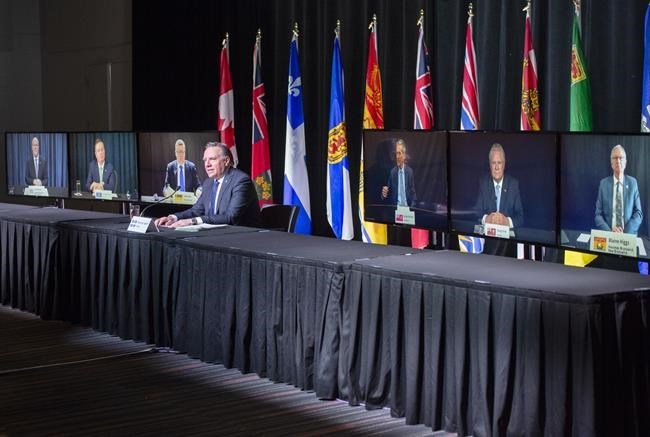OTTAWA — With a federal budget in the offing, premiers are stepping up the pressure on Ottawa to immediately boost health-care funding by at least $28 billion a year.
They held a virtual news conference Thursday to reiterate their demand for a big increase in the unconditional transfer payment the federal government sends provinces and territories each year for health care.
The federal government this year will transfer to the provinces nearly $42 billion for health care, under an arrangement that sees the amount rise by at least three per cent each year.
But the premiers contend that amounts to only 22 per cent of the actual cost of delivering health care and doesn’t keep pace with yearly cost increases of about five per cent.
Starting this year, they want Ottawa to increase its share to 35 per cent and maintain it at that level, which would mean an added $28 billion, rising by roughly another $4 billion in each subsequent year.
During a virtual first ministers' meeting in December, Prime Minister Justin Trudeau told premiers he recognizes the need for the federal government to eventually shoulder a bigger share of health-care costs.
But he said that must wait until after the COVID-19 pandemic, which has sent the federal deficit on track to exceed an unprecedented $381 billion as Ottawa doles out emergency aid, including at least $1 billion for vaccines and $25 billion in direct funding to the provinces to, among other things, bolster their health systems.
Quebec Premier Francois Legault, chair of the premiers' council, stressed Thursday that the pandemic-related expenses Ottawa has incurred are "non-recurring." He pointed to studies that suggest the federal government could quickly eliminate its deficit, and even return to surplus, once the pandemic is over while provinces would be mired in debt.
The premiers argued they need stable, predictable, long-term funding for their health systems, which were already under strain before the pandemic hit and will be even more stressed once it's over and they must deal with the backlog of delayed surgeries, tests and other procedures.
Manitoba's Brian Pallister said wait times have been a problem for decades and are destined to get worse as Canada's population ages. But he said the pandemic has made "a bad situation much, much worse."
"The post-pandemic pileup is coming and it's real and its impact on Canadians and their families and their friends is real too," he warned.
"The time is now to address this issue and to address it together."
Pallister accused Trudeau of ignoring the problem of wait-times and the real life-threatening impact on people. Five years ago, he said he told Trudeau a true story about a woman with a lump in her breast who had waited for tests and referral to a specialist, only to be told in the end that it was "too bad we couldn't have caught this sooner."
"He looked across the table at me and said, 'I'm not your banker,'" Pallister said.
"We don't need a banker. We need a partner."
Trudeau has offered to give provinces immediate funding for long-term care homes, provided they agree to some national standards. Long-term care facilities have borne the brunt of deaths from COVID-19.
But Ontario Premier Doug Ford said Ottawa's latest offer would provide just $2,500 per person in long-term care — a drop in the bucket compared to the $76,000 it costs his province each year for every long-term care resident.
"The math doesn't work," he said.
Legault ruled out conditional transfers for long-term care altogether as an intrusion into provincial jurisdiction. He said each province and territory has its own health-care priorities and their "jurisdiction must absolutely be respected."
When universal health care was adopted in Canada, British Columbia's John Horgan said the cost was originally shared 50-50 between Ottawa and the provinces. The steadily declining federal share has led to ever more challenges in delivering health care, exacerbated now by the pandemic.
"Our public health-care system is at risk," Horgan warned.
"COVID has brought (the challenge) into graphic light. It's stark, it's profound and we need to take action."
Saskatchewan's Scott Moe said Canadians deserve a well-funded health system "that is supported by both levels, both orders of government in this nation, not one that is propped up by almost entirely by the provinces and territories."
Trudeau's minority Liberal government is poised to table a budget this spring, which could theoretically result in the defeat of his government should opposition parties vote against the budget.
Legault said premiers have already talked to opposition parties to solicit their support for their health funding demand. He said the Bloc Quebecois and NDP support the demand, while the Conservatives agree in principle with the need to increase the health transfer but have not specifically agreed to the $28-billion figure.
This report by The Canadian Press was first published March 4, 2021.
Joan Bryden, The Canadian Press



